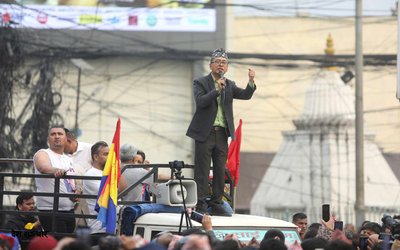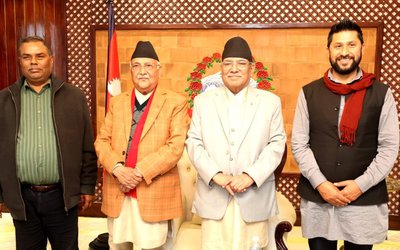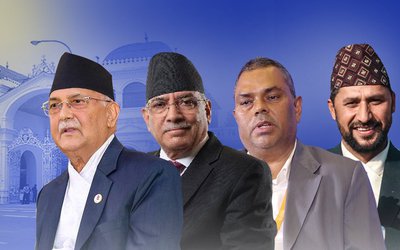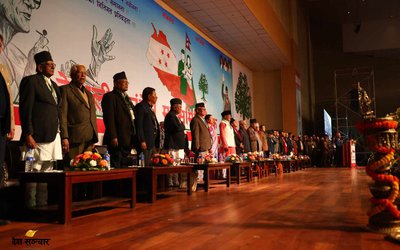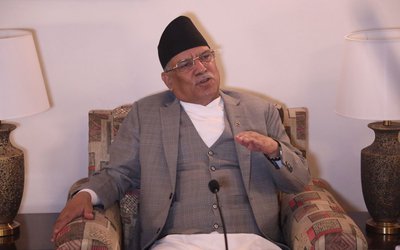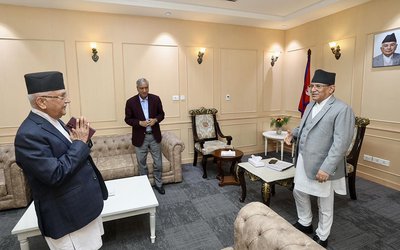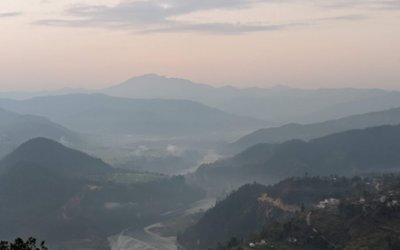Known radical leaders of UCPN-Maoist Mohan Baidya and Dev Gurung went to offer condolences to Nepali Congress leader Sher Bahadur Deuba, who was mourning his father’s death, in his house in Budhanilkantha . When they were talking, Nepali Congress leader Ram Chandra Poudel also joined in the discussions.
From radical Maoist leader Baidhya to NC leaders Deuba and Poudel, all were discussing what was necessary to promulgate the constitution and conclude the peace process before the May 27 deadline. “I am not an opponent of the constitution and the peace process,” said Baidhya, who is projected by media as a hardliner. Nepali Congress leader Deuba and Poudel indicated the possibility of a compromise on the integration issue.
In informal meetings, Nepal’s political leaders show a very human and responsive behaviour among one another. However, their posture is different when they speak in the public.
Not only Baidhya, Congress leader Deuba, Prime Minister Dr. Baburam Bhattarai, UCPN-Maoist leader Pushpa Kamal Dahal Prachanda, Nepali Congress leader Sushil Koirala and CPN-UML leader Madhav Kumar Nepal and UML chair Jhalnath Khanal often meet and come out with a statement that they have agreed to make concessions.
However, their commitments rarely materialize. Whether it is in the peace process or constitution writing, they are several agenda apart to make agreements. But, all these issues can be settled within a minute as there are not many ideological differences among them.
“One of the positive sides of Nepalese politicians is that they can sit together despite their political differences. This is a hopeful sign that your country will take the right path by promulgating the new constitution and concluding the peace process,” said a western diplomat on condition of anonymity. “These kinds of heart to heart relations are not there in other parts of South Asia.”
But, their heart to heart relations and commitments to bring stability back in the country are rarely getting materialized. Their statements rarely matter in the context of decision making. Nepal’s renowned constitutional lawyer and political analyst Ganesh Raj Sharma used to say that Nepal’s political reality is that invisible players are more powerful than the visible ones in exercising political powers.
He argued that Nepal’s political alliance are made and broken strangely. For instance, Nepal’s communist parties hold more than two thirds in the CA. However, leader Baburam Bhattarai of radical UCPN-Maoist prefers to head the coalition with rightists and regional parties like Madhesis.
Nepali Congress, whose workers suffered a lot during the people’s war, joined the front dominated by all radical leftists to overthrow the liberal system and monarchy. Similarly, Baidhya, who is said to be communist ideologue, and is calling to establish the people’s communist republic, has just made an alliance with ethnic and caste based groups to launch an agitation. As a communist, Baidhya was supposed to raise the issue of classes rather than of castes. Marx, Lenin, Stalin and Mao were able to make revolutions through the class war. However, Nepal’s ultra left communists and other communists are harping on the agenda of ethnicity and caste.
One may not be surprised at the upsurge of any kinds of alliances. As the prominent constitutional lawyer said, alliances are made and broken not on the wish of visible players but due to the invisible political players. This was there in the past and it will be there for a long time to come.
In a politics of contradictions, whether there is a constitution or not, be it in peace or violence, it is almost certain that Nepal has to go through a long process before installing a political stability. Nepal’s hard reality is that the statements and relations of Nepal’s political leaders are less a matter in the process of final negotiations.
- TANAHU HYDROPOWER PROEJCT: A Significant Achievement
- Apr 15, 2024
- AMBASSADOR HANAN GODAR: Sharing Pain With A Nepali Family
- Mar 30, 2024
- VISIT OF KfW AND EIB TO NEPAL : Mission Matters
- Mar 25, 2024
- NEPAL BRITAIN SOCIETY: Pratima Pande's Leadership
- Mar 24, 2024
- NEPAL ARMY DAY: Time To Recall Glory
- Mar 15, 2024

